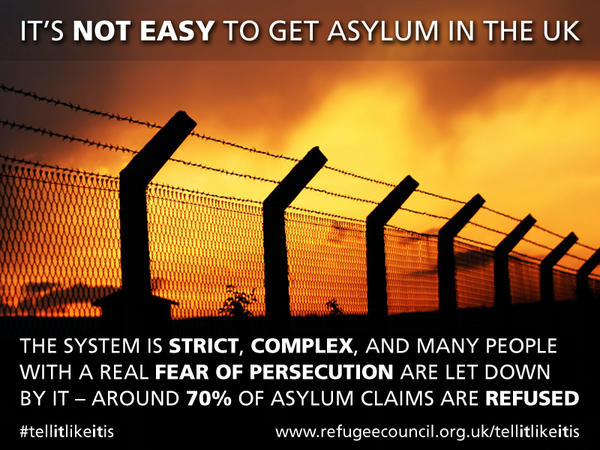 Isimeli Baleiwai at home with his two children, aged three and six
Isimeli Baleiwai at home with his two children, aged three and six
A Fijian man who served in the British Army for 13 years is fighting to stay in the UK after being told he must leave the country by 9 August.
Isimeli Baleiwai served in Afghanistan and Iraq, before leaving the Army in June. He is married to a UK national.
But disciplinary action for a 2010 fight with a colleague means he is considered to have a criminal record.
The Border Agency said applications for settlement by ex-forces personnel were considered the same way as all others.
"This involves consideration of a range of factors including unspent convictions, whether passed by military courts or resulting from police involvement," a spokesperson said in a statement.
Lance Corporal Baleiwai - known as "Bale" - was born in Fiji but told the BBC's Angus Crawford he now considered the UK his home. He is married to Kim - a British national with whom he has two children, aged three and six.
The 32-year-old applied for British citizenship in March 2012 because he planned to leave the Army. He left voluntarily on 15 June after 13 years' service.
Foreign and Commonwealth soldiers can apply for Indefinite Leave to Remain after four years' service, and citizenship after five.
L/Cpl Baleiwai served in Bosnia, Northern Ireland, Iraq twice and once in Afghanistan.
In 2011, his commanding officer said his performance was "of an exceptionally high standard". L/Cpl Baleiwai was rated "an excellent junior NCO [non commissioned officer]" who was "always leading from the front". "He is charismatic, selfless and well-liked," the officer said.
Continue reading the main story
“Start Quote
I wasn't good enough to be a citizen of this country and yet throughout those 13 years I've paid my taxes, I've served Queen and country and I felt betrayed at this point”
Isimeli Baleiwai
But on 28 June 2012, L/Cpl Baleiwai heard that he had been refused citizenship and would also be refused Indefinite Leave to Remain because he had what the UK Border Agency (UKBA) classed as a criminal conviction so was not of "good character". On 12 July he was informed by letter that he must leave the country by 9 August.
L/Cpl Baleiwai said he had returned from Afghanistan "a mess", suffering from flashbacks and drinking heavily.
"To me, there was nothing wrong - I was normal. But now that we've had time to look back, everything was going wrong. The drinking was getting out of hand; I was getting in a mess that I was struggling to get out of." L/Cpl Baleiwai said that he then ended up brawling with his colleague.
Under changes in 2010 to the Rehabilitation of Offenders Act 1974, disciplinary offences and crimes under military law automatically carry over into civilian life. However, our correspondent said many disciplinary offences in the military would not be offences in civilian life and the military process lacked some of the checks and balances of civilian courts.
L/Cpl Baleiwai said that his fight lasted less than a minute and his colleague suffered a broken filling. He pleaded guilty at the subsequent disciplinary hearing before his commanding officer and was fined £1,000. He said he had been offered a solicitor but waived his right because he just "wanted the case to go away".
"To me as far as I understood it, that was it - that was the end of it," he said. However, the incident is now preventing him from staying with his family in Britain.
'Implications are massive'
L/Cpl Baleiwai said that soldiers coming back from combat zones were likely to be emotionally damaged as a result of serving Britain, and that the UKBA should make allowances when considering their applications.
 Isimeli Baleiwai completed two tours in Iraq, as well as serving in Afghanistan and Bosnia
Isimeli Baleiwai completed two tours in Iraq, as well as serving in Afghanistan and Bosnia
"We're not going to be coming back of sound mind and good character because of what we've been through - the trauma we've been through," he said. "People who are making these rules, passing those laws, they don't understand what that feels like."
L/Cpl Baleiwai and his wife have written to their MP, the Home Office, Number 10, the Ministry of Defence, the Labour Party and former head of the Army Lord Dannatt to try to get permission for him to stay. So far, they have had no success.
"I was proud to have served in the Army and for that 13 years service I was seen as a British soldier but to the UK Border Agency, as soon as that uniform comes off I'm no longer a British soldier, but just a foreign Commonwealth person trying to reside in the UK," he said.
"But at this point I had a British family, I had a British wife - two kids that are British - and I'd been given this letter saying that I wasn't good enough. I wasn't good enough to be a citizen of this country and yet throughout those 13 years I've paid my taxes, I've served Queen and country and I felt betrayed."
Mrs Baleiwai said that the support the couple had received had reminded her of why she was "proud to be British" but that what had happened to her husband made her "feel ashamed".
"I want to fight this for my husband and my family because I believe it's wrong - I've believe it's incompetent of the government to make these decisions," she said.
Veterans Aid chief executive Dr Hugh Milroy said it seemed "completely incredible" that L/Cpl Baleiwai was being barred from the UK because of his brawl.
"This is so minuscule as an incident, but the implications are massive," he said. "This should have been done and dusted and gone."
Bron:
http://www.bbc.co.uk/news/uk-18940236
 Law blog
Law blog Klik op +1 als u dit een interessant artikel vindt en Google zal het dan beter zichtbaar maken in de zoekresultaten.








